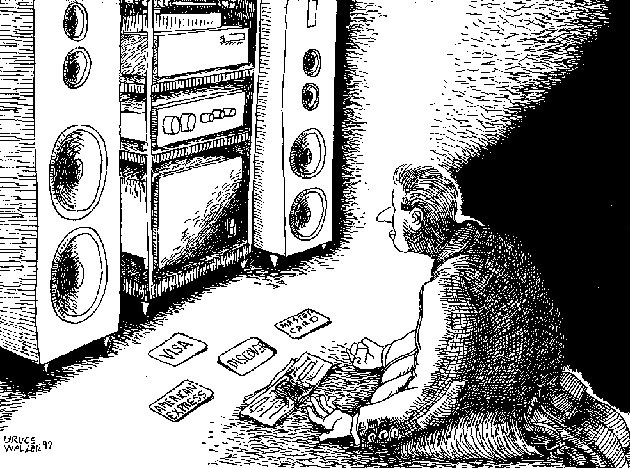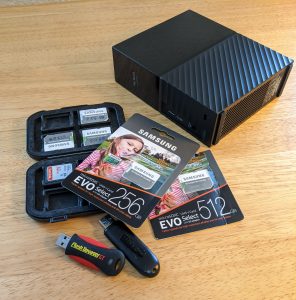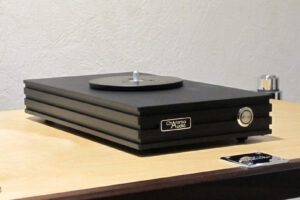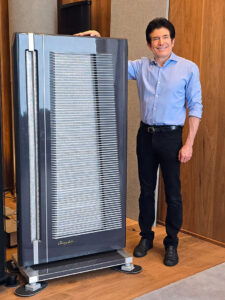Roger Skoff writes about audiophilia
No matter how busy we are with home, family, making or spending money, or any of our other more mundane concerns, all of us have time and resources that are not demanded for something else, and things that we do or enjoy for no reason other than simply that we do or enjoy them. Some of those things, if they are concentrated and continuing, and that may even seem to others to approach or even transcend the level of OCD, are called hobbies.
A hobby can be practically anything, from Astrophysics to just Zoning-out. It can involve making, doing, or using something, or simply—like bird watching, listening to music, collecting something, or enjoying the arts—be passive enjoyment of something done or created by someone else. And people can have as many hobbies as they wish.
The only basic requirements for a hobby are that we do it by choice, that it will accept as much or as little time, money, or other resources as we wish to commit to it, and that it never be completed. (If it were, we'd have to go find a new hobby!)
One hobby that, because you're reading this article, I think it's safe to assume we all share is audiophilia or, to use the term that I and my friends came up with when we were just kids, "HiFi Craziness." I‘ve personally been a HiFi Crazy since I was twelve years old (that makes seventy years, now), and like most other people I‘ve met, I've also had and maintained other hobbies along the way. (HiFi Crazies seem, also, to tend to be either Car or Motorcycle Crazies, Camera Crazies, or both, and, of course, sports fans are ubiquitous.)
Of all the hobbies I've ever had, though, or been exposed to, I can say flatly that audiophilia is by far the strangest.
In every other hobby, differences are expected and are recognized without question. No bird watcher would ever deny that there is a difference between a chicken and a vulture. No Car or Motorcycle Crazy would ever deny that there's a difference between different brands or kinds of vehicles, tires, fuel systems (carburetion or fuel injection) or any other part or brand of parts or accessories for their machine. No sports fan would ever say that all teams or players are the same. The differences in the things, themselves and in the results of using them—are obvious and clearly documentable. And although there may be subjective differences in how much they are liked, no Camera Crazy would ever doubt the difference between digital and film or between different films or lenses or shutter speeds or anything else about their cameras or the pictures they take with them.
In Hi-fi, though, organizations as prestigious as the Audio Engineering Society (AES) and countless others have formally claimed, and even offered proof—by double blind testing, the so-called "gold standard" (but actually inapplicable to a musical signal) of test procedure—that there is no audible difference between audio amplifiers. There is constant debate on the internet and in the audio press about whether power products (AC power cords, accessory filters, power plugs and outlets, power conditioners or re-constructors—AC to DC to AC again—devices) make any difference at all. Ever since the earliest days of Randall Research and Monster Cable, there has been unending debate over whether accessory cables (interconnect, phono, digital, speaker, headphone, Ethernet, USB, and every other kind) make any difference at all, or are simply scams and rip-offs charging anything from moderate to astronomical prices.
Add to that a whole array of "sound quality improvement" products ranging from green paint for the edges of CDs, to mysterious wooden things, to magic stickies, to resonant brass bowl things, to miraculous electronic things—all claimed to work in the absence of any proof at all, and other things that definitely do work (like spike feet and vibration damping feet [EVPs]), but that function in exactly opposite ways to produce exactly opposite results, and whose advocates on either side all claim to be "The One True Solution" to energy transfer problems, and you wind up with a hobby where reason seems to have no place at all but is being attacked by both sides in the name of reason.
"The final tweak" (drawing by Bruce Walker)
The other thing about audiophilia that I find to be at least strange, (but which probably contributes to the problem just named), is the shocking level of technological innocence of the adherents to this definitely technological hobby.
It's not surprising. Most audiophiles seem to come to the hobby, not from a physics or engineering background, but either from a love of music, or (like me) as the result of getting "blown away" and hooked forever by some life-changing sonic experience. Either that, or they just "picked it up" from audiophile friends or family or maybe they aren't audiophiles at all, and just bought their system as another entertainment source, like their TV.
However we came to HiFi, and to whatever degree we're "into" the equipment—either viewing it as just something to make the music for us, or as outright gearheads, all too few of us actually know how our equipment works, how to properly set it up, or how to tell the difference—based on fact and real knowledge—between something that can make a genuine improvement or its opposite—pure (to use favorite audiophile terminology) voodoo or snake oil.
Making it even worse are four tendencies that we all have and may even have been trained to.
The first is to doubt our own ears and, put simply, that's utter nonsense. The only reason we have a system is to please our ears, so to believe the doubters or nay-sayers when they talk about "placebo effect" and our ears deceiving us is idiocy. If our ears and the tastes and preferences backing them say that something is good or bad—they're what we have to listen to it with, so believing them is ultimately what we're going to have to do, whatever we buy or don't buy. Measurement or "objective" testing is best reserved for manufactures in designing what they offer to us for sale. Regardless of what it shows, what we're going to have live with is how whatever we buy sounds when we get it home and into our system, so anything else that might be heard or measured anywhere else is irrelevant.
The second is a tendency that I think we're unfortunately all prone to: believing that more or less expensive must automatically mean more or less good. That's simply nothing like true. The most obvious proof being that even the genuinely best, most expensive system in the whole world can't sound good if it's in a room that's an acoustic disaster. In a case like that, spending $1000 on room treatment might make more of a sonic improvement than spending a hundred times than that amount on more expensive gear. And remember that there are countless cases where, regardless of any other factor, cheaper goods have been described by reviewers—even in Positive Feedback—as outperforming others significantly more expensive.
The third is a tendency to believe our eyes when, instead, it's our ears or our mind that we should be using to make our decisions. Pretty sells. So does "tech-y"-looking. So does exotic. So does simply a reasonable sounding but neither true nor physically possible solution to a problem that may, itself, not be real. If you do the math on available energy and what can be done with it, you'll see that many of the so-called "magical" products named above simply can't work. And carbon fiber is beautiful, but even though my own company uses it for decorative purposes, I know of no way that it can—in any of the audio applications I've seen it used for—positively affect sound quality. Another similar thing is gold or gold plating. it's only real purpose other than decoration is to keep the surface under it from corroding. Gold's conductivity is less than copper, so gold wiring or gold-plated connectors are not going to improve current flow.
To a very substantial degree, special effort to create more salable products by making them more expensive looking is a vicious cycle. If a good product costs more to build than a lesser one, the price has to be higher. But, when the manufacturer uses, for example, gold or carbon fiber trim to make it look like it's worth more, that makes it more expensive to build, which drives the price up, and the process goes around and around again. Speakers, tonearms, and turntables can be prime examples of this and some—even if they do offer performance advantages—have gotten so baroquely complex, so absurdly overbuilt, and so phenomenally expensive that I am amazed that anyone would either want to, or be able to afford them.
A fourth, but certainly not final audiophile characteristic is reserved for do-it-yourselfers. The idea that improvement is possible and that we can make significant improvements ourselves is certainly reasonable. More than one (well more than one) respected HiFi manufacturer started out as a home HiFi Crazy and wound up getting —possibly even to his own surprise—into the industry.
The real difficulty is that, at least for speakers, cables, and accessory products, you don't need to have expert knowledge to "luck into" something that works. Any driver or combination of drivers in any box, or no box at all, with any crossover or no crossover at all, if properly wired together and connected to an amplifier and signal source, will make sound. And any two conductors—a railroad tie and a hair-thin "hookup" wire—if connected to complete a circuit, without either "shorts" or "opens"—will pass current. And the maker of either of those can be proud of himself and declare himself to be a designer.
Unfortunately, unless that luck either continues or is backed-up with real knowledge, nothing real can come of it. Even so, the "designer," even without any intent to deceive, can declare a discovery or a new process or a new material, and other HiFi Crazies may believe him and we can wind up with more products to eventually perpetuate more claims of voodoo and snake oil—real ones, this time.
Our hobby may be so strange because, unlike many others, it is one hundred percent subjective in its determination. As I have said before, nobody—not even the performers, the recording engineer, the audience at a live performance, or anybody else, knows what music actually sounds like to anyone other than himself if he actually was there. And many studio recordings never have anything that can be called an "original" performance, so there's no true standard at all of how well our system is reproducing it. All there is are our own tastes and preferences, and our guess at what it ought to sound like.
Sports have scores. Races have finish times. Other hobbies have real standards for judging who won, what was done, or how well. Ours doesn't; it's entirely up to us, individually, to determine our (and our system's) success in achieving our performance goals.
It's strange, but I like it that way.



































